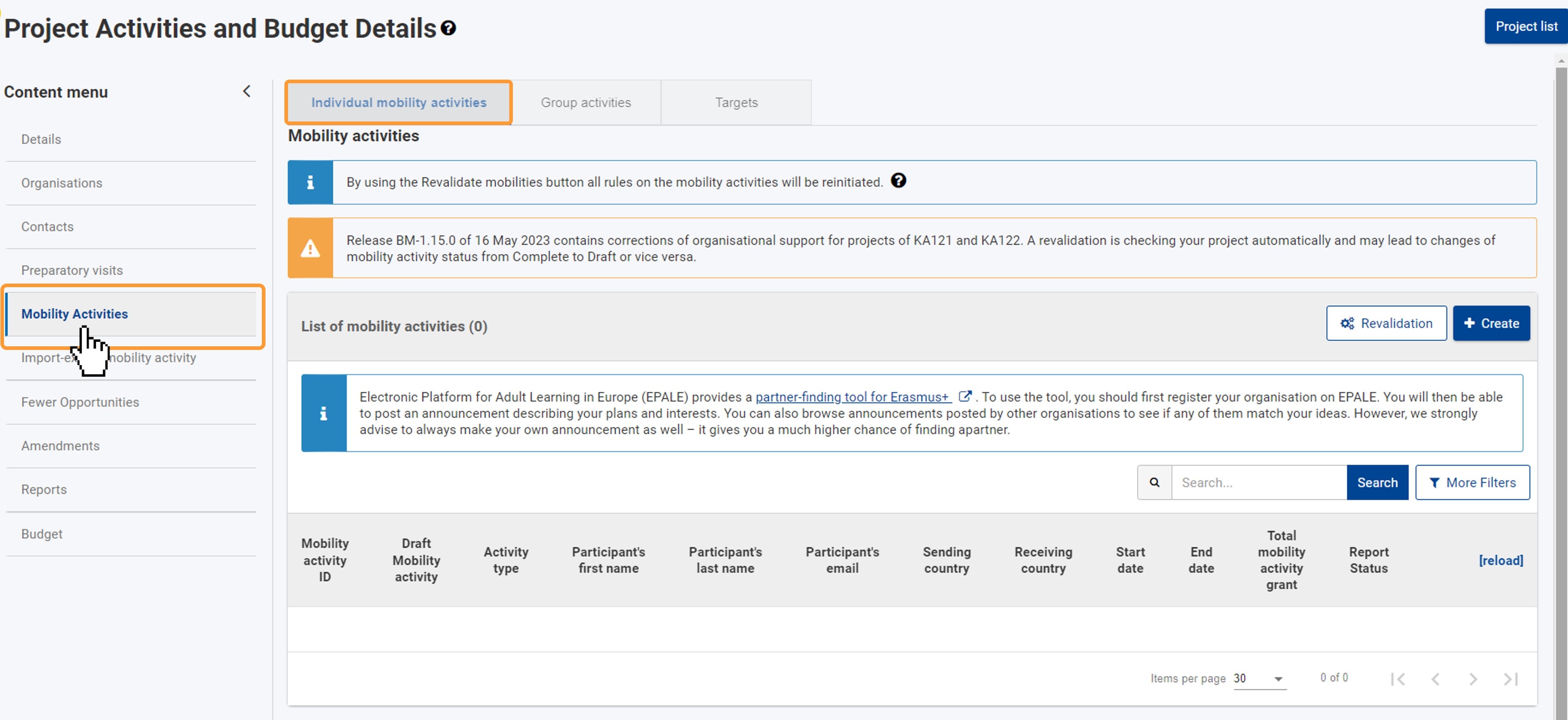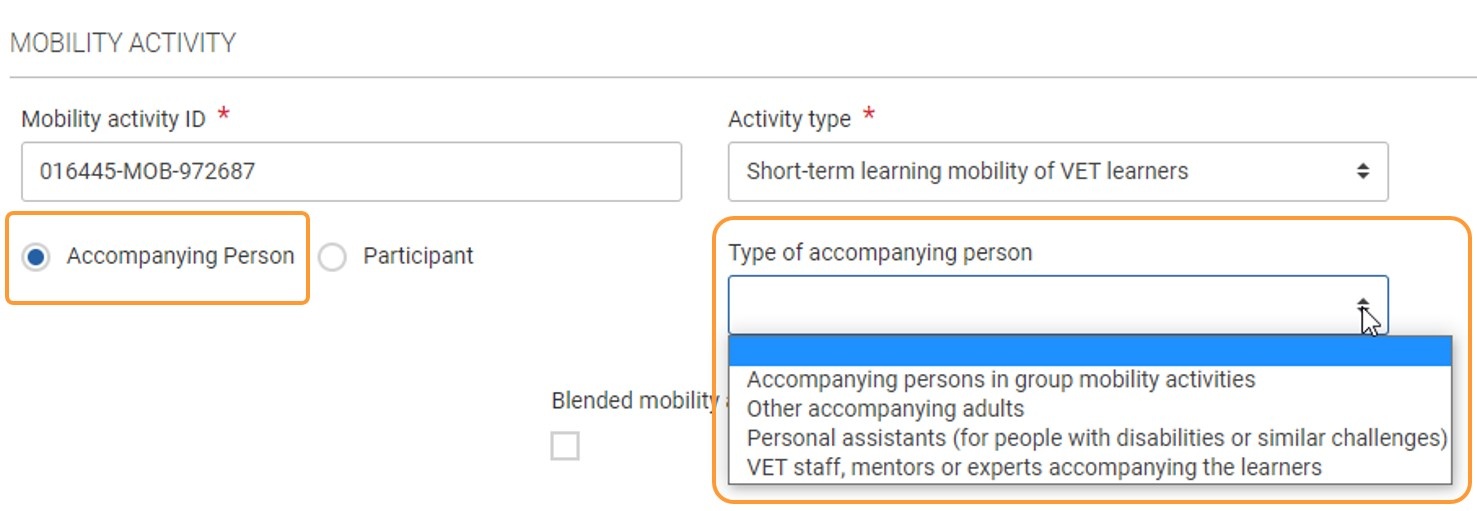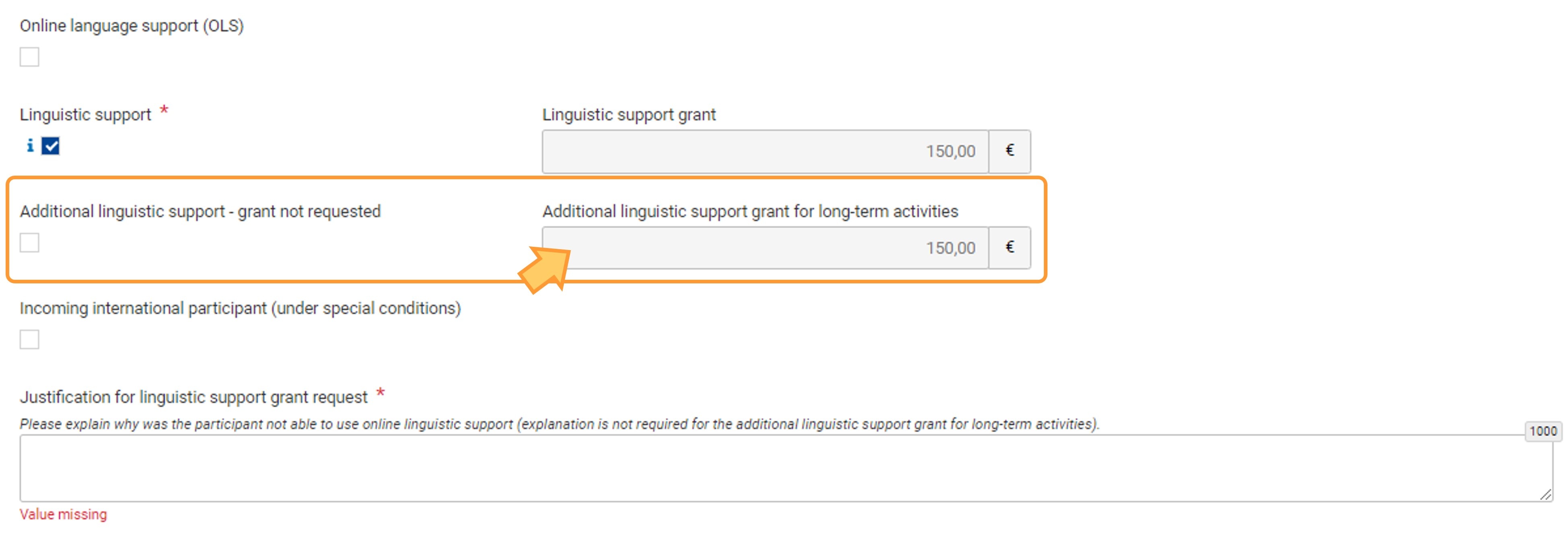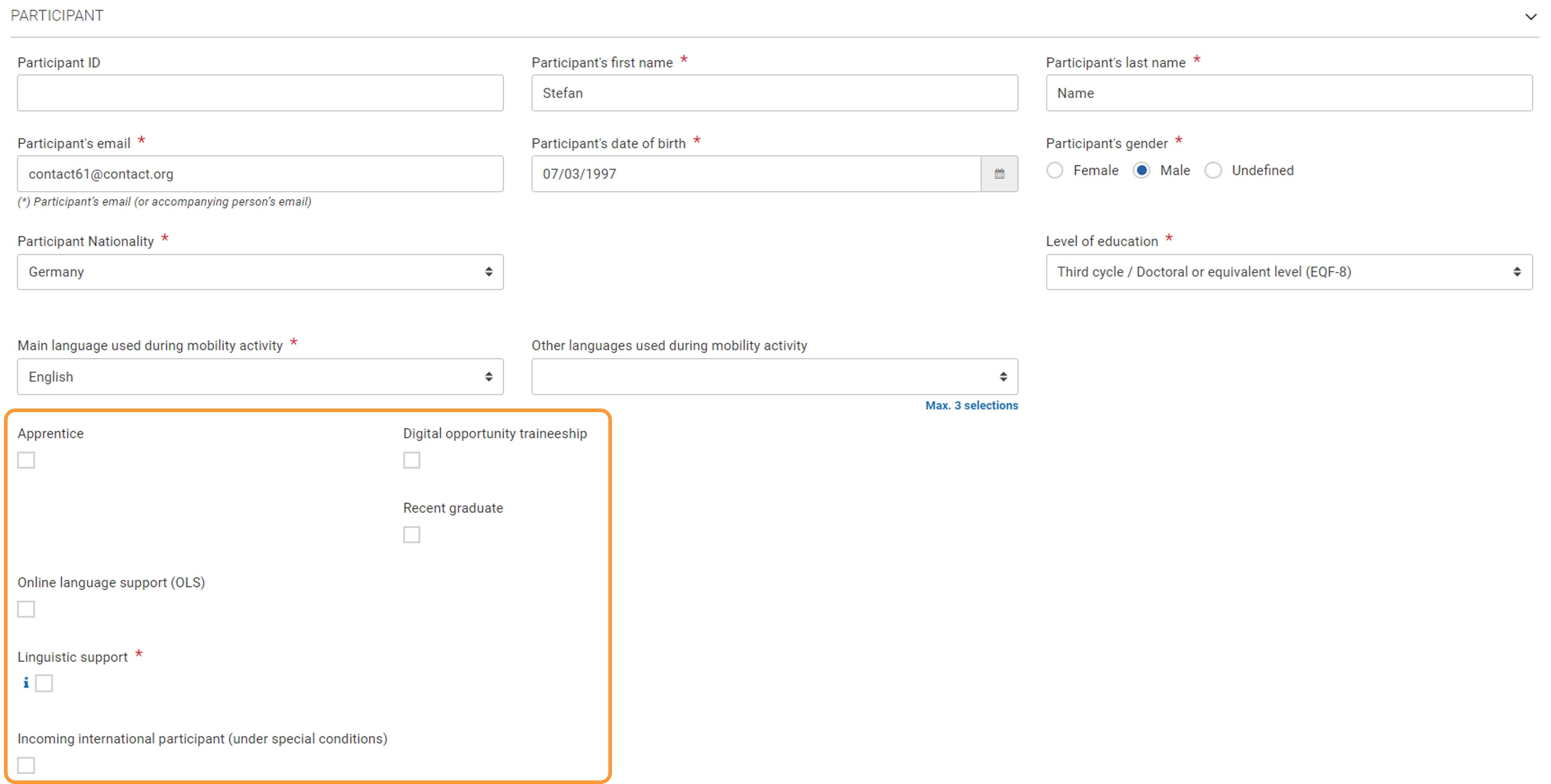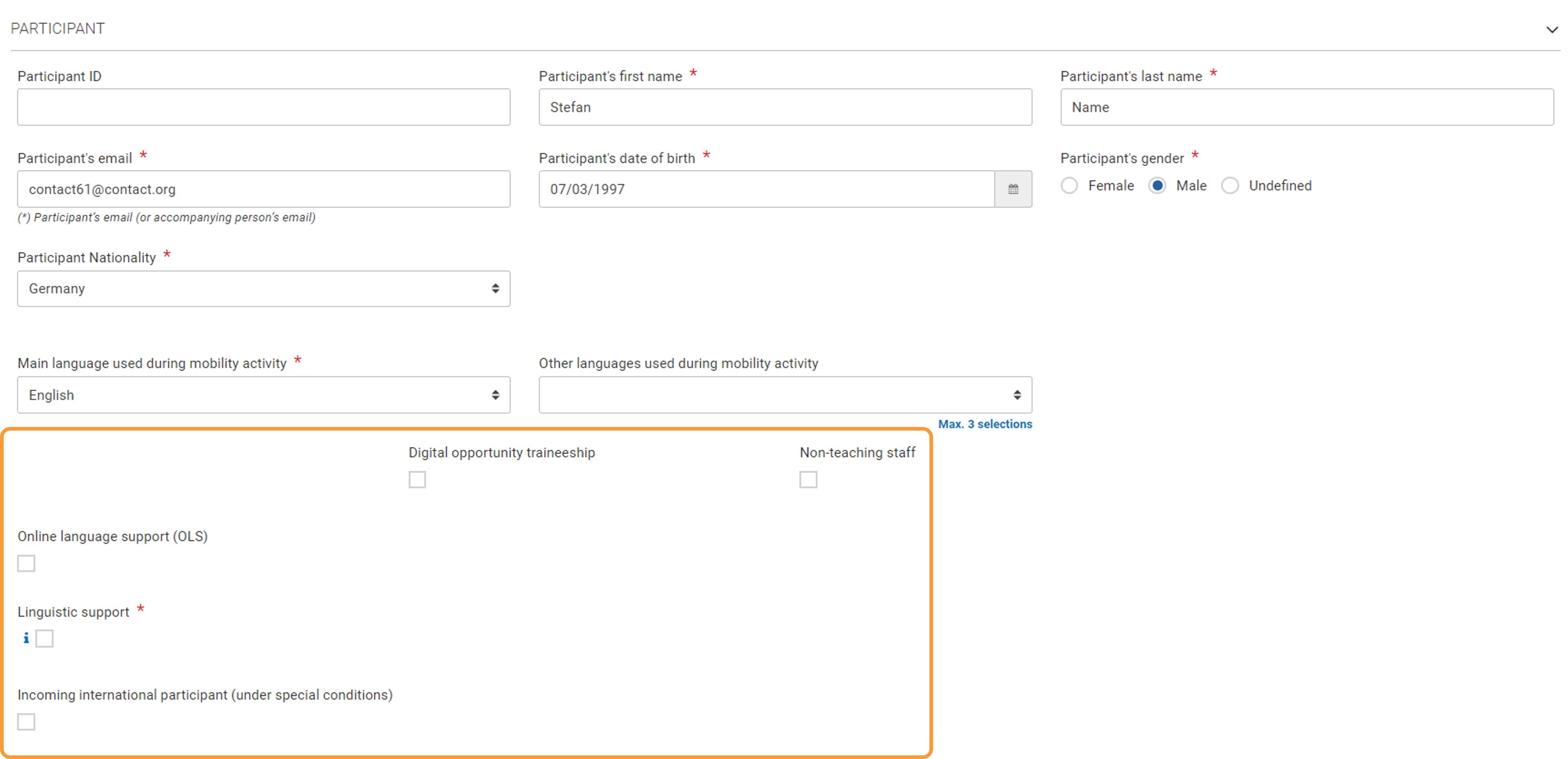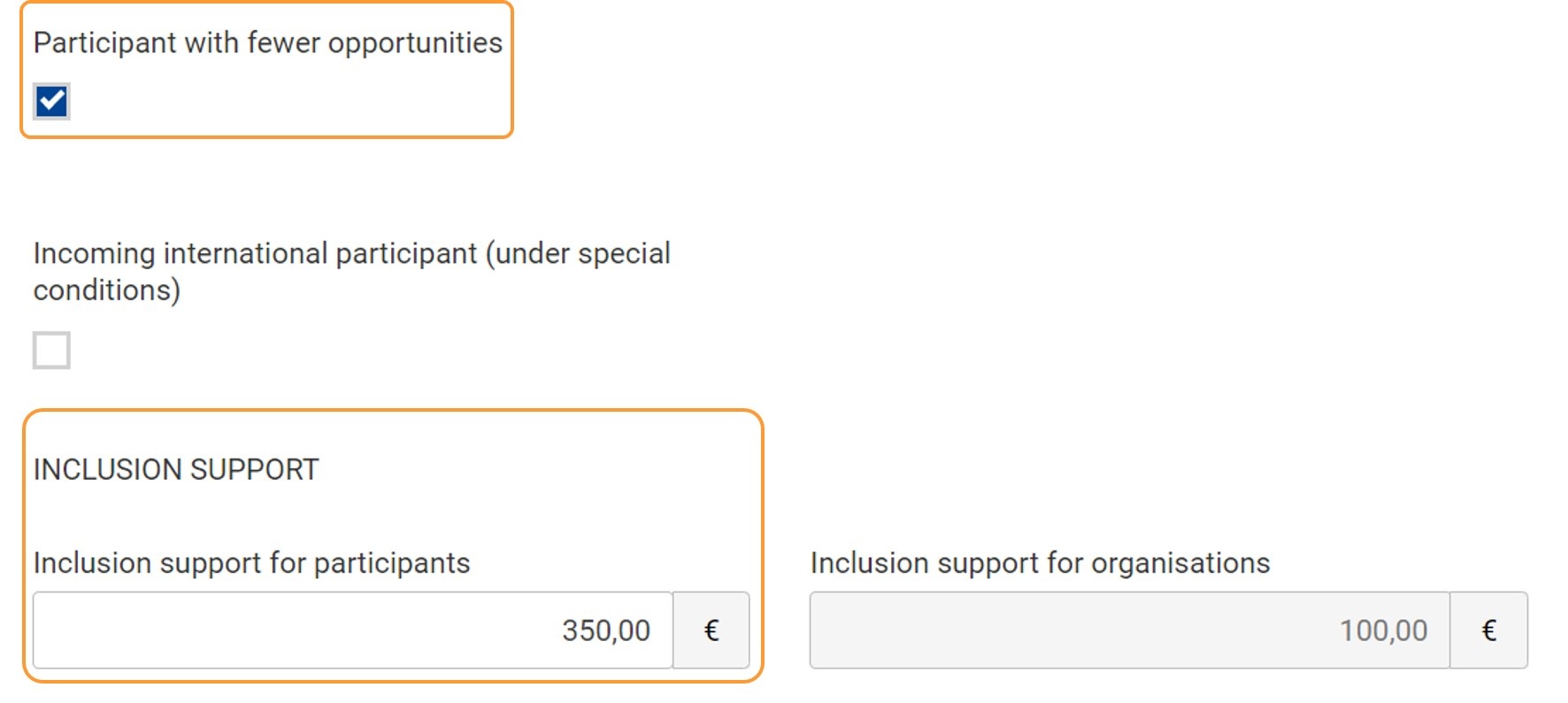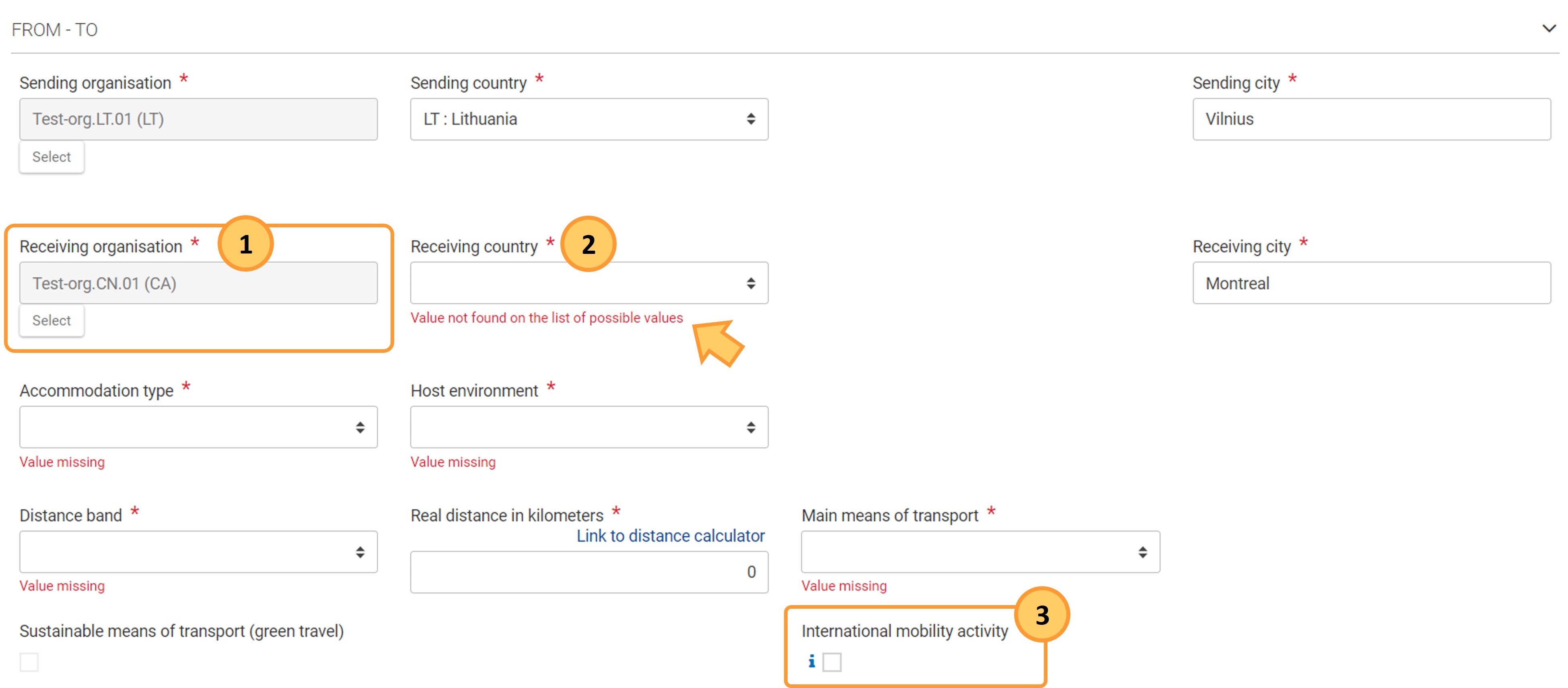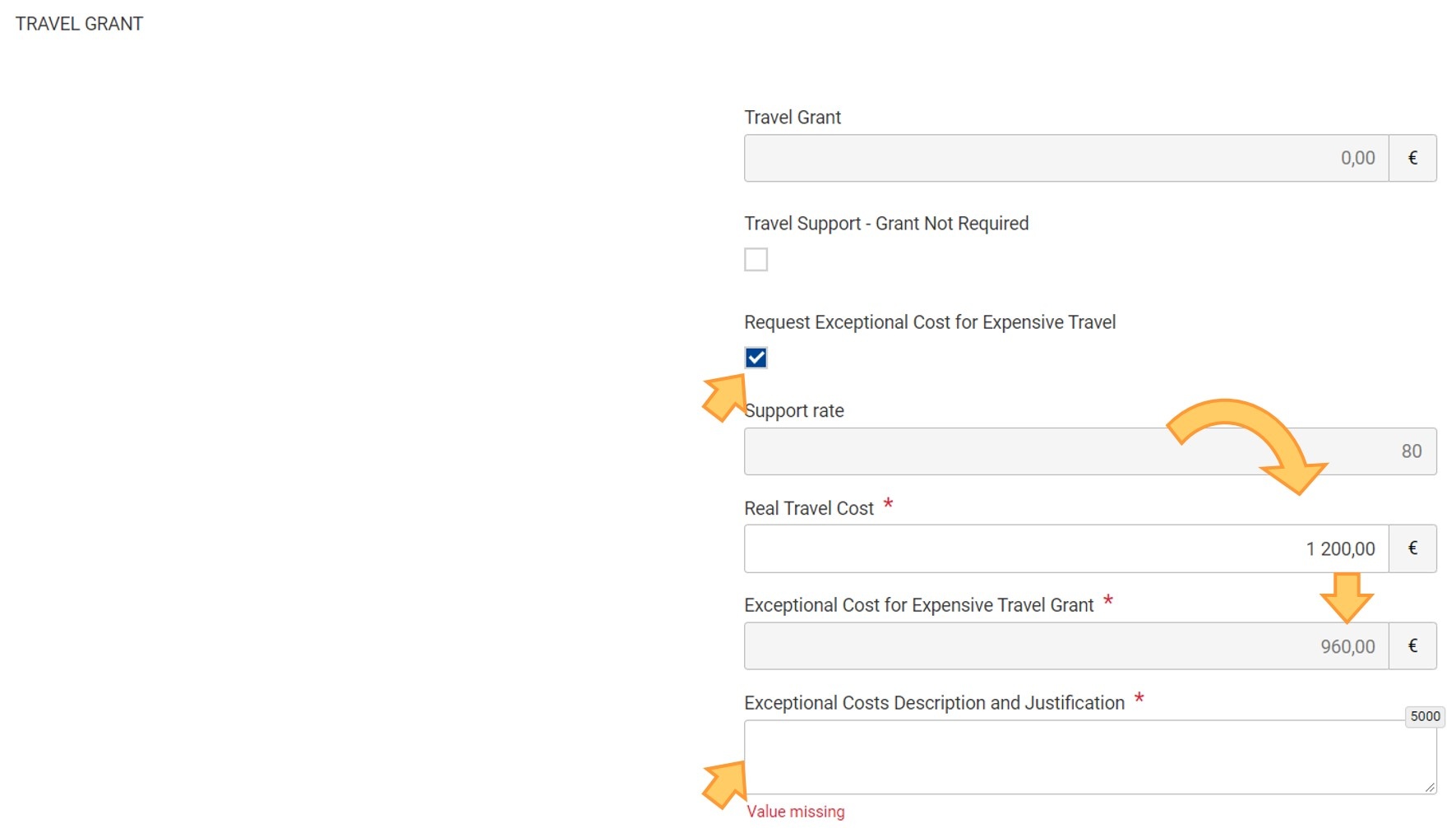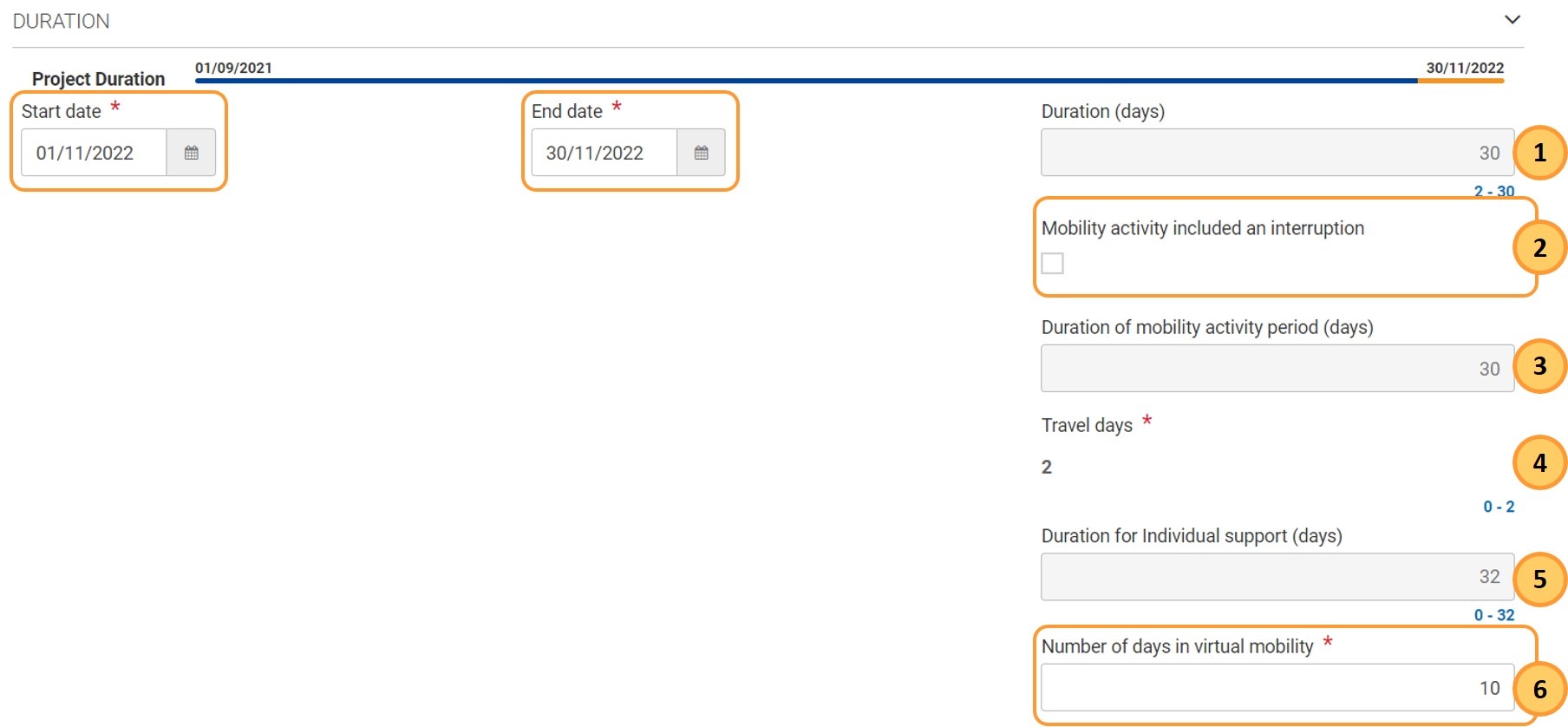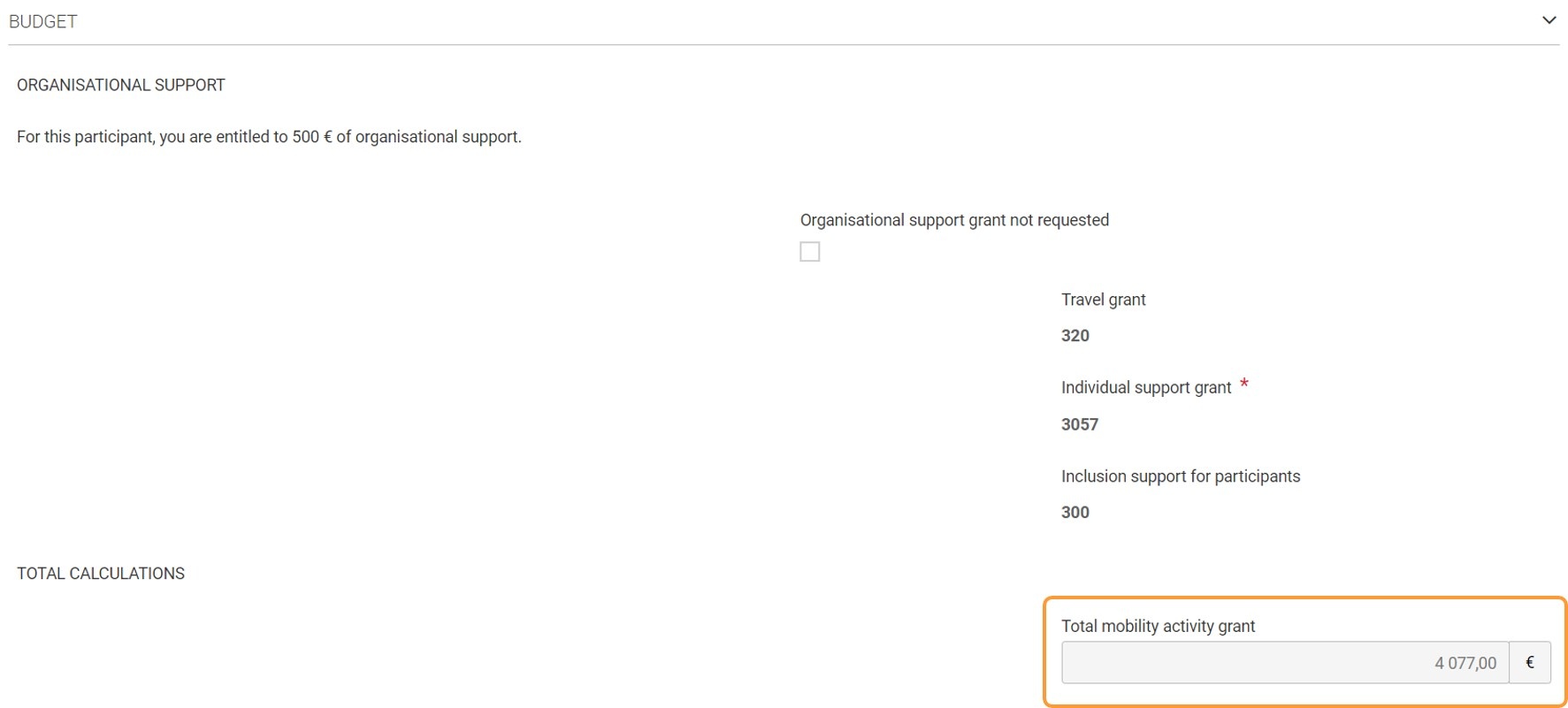This page outlines the specifics for (individual) mobility activities carried out within projects under Erasmus+ KA121 - Mobility for learners and staff of accredited organisations and KA122- Short term projects mobility of learners and staff.
Questions and fields vary in accordance with the selected activity type. Please read the onscreen information carefully when filling in the fields. The form content will adapt based on your input. The form will also provide feedback such as warning messages or error messages in case there is missing information or eligibility rules are not observed. |
This page is relevant for:
|
Access "Mobility Activities"Individual mobility activities are accessible in a separate tab when accessing Mobility activities via the Content menu in your project. It is from here that you can manage the individual mobility activities of the project. The tab Group activities, available for ADU and SCH projects, will allow you to manage these type of activities. See Group activities in KA121 and KA122 projects for details. The tab Targets, available for VET, ADU and SCH projects, will allow you to manage these type of activities. See Targets in projects (KA121) for details.
EPALE in KA121-ADU and KA122-ADU Activity typesIn the Mobility activity screen, the activity types available for selection from the Activity type drop-down list differ slightly depending on the activity field and call year applicable to your project. Group activity types are not listed here, as they must be managed in the Group activities section of the project. The fields to fill in throughout the mobility activity screen vary based on the selected activity type.
"Mobility Activity" sectionMobility activity ID"Participant" flagThis flag is checked by default, when creating a mobility activity. A mobility activity flagged as Participant cannot be an Accompanying Person. "Accompanying Person" flagTake note of the following:
"Blended mobility activity" flagIn KA121 and KA122 projects, you must provide details about the virtual component in the Duration section of the mobility activity screen. "Force majeure" flag
If the Force majeure flag is set, the following duration and grant fields are affected:
"Participant" sectionThe flags available for participants vary according to the selected activity type. They may affect other fields in the participant and budget sections, as well as require additional data to be provided. Certain flags are mutually exclusive. "Online language support (OLS)" flag
"Linguistic support" flag and Linguistic support grantWhere available, a Linguistic Support grant can be requested by checking the Linguistic Support flag in the Participant section of the mobility activity screen. The Linguistic support grant is calculated automatically and cannot be changed manually.
If you request a Linguistic support grant you must provide an explanation in the Justification for Linguistic support grant request field. Linguistic support is not available if/for:
A tooltip is available for the Linguistic support flag, informing you of the specific rules for this cost item.
For participants in activities of type Long-term mobility of VET learners (ErasmusPro), Long-term learning mobility of pupils and participants flagged as Incoming international participant (under special conditions), an Additional Linguistic support grant for long-term activities is provided (calculated automatically). If you do not require the additional grant, check the flag for Additional Linguistic support - Grant not requested.
"Incoming international participant (under special conditions)" flag
"Inclusion support" sectionInclusion support for Participants with fewer opportunitiesInclusion support for organisations covers costs related to the organisation of mobility activities for participants with fewer opportunities. It consists of a flat rate of 100 euros per participant, regardless of the duration of the mobility activity. This amount cannot be manually changed, except in cases of force majeure. Take note of the following:
"Request inclusion support for accompanying persons" flagFor mobility activities flagged as Accompanying person, it is also possible to request inclusion support. Tick the Request inclusion support for accompanying persons flag in the inclusion support section and provide the requested amount in the Inclusion support for participants field.
"Participant survey" sectionInitially this section is empty.
"Recognition Certificates" section
"From-To" sectionSending and Receiving organisation
Select the Sending and Receiving organisation. Organisation role in mobility activity"Outer-most region (OCT)" flagAccommodation typeFor certain activities in school mobility projects, in addition to the details of the sending and receiving organisations, you must also specify the Accommodation type, by selecting it from the drop-down list. In addition, for certain activities in VET mobility projects, also specify the Host environment.
Distance band and Main Means of Transport"Sustainable means of transport" flag
"Request second travel grant for obligatory pre-departure training" flag (SCH projects only)"International mobility activity" flag (KA121-VET projects only)International mobility activities can only be implemented in KA121-VET projects, meaning the Receiving Country of the mobility activity screen can be a third country not associated to the Programme. After selecting a Receiving organisation (1) located in a third country, the Receiving country (2) field will remain empty and the International mobility activity flag (3) is displayed.
Tick the International mobility activity (1) flag to populate the Receiving country (2) field.
The reported budget for international activities is displayed in a dedicated tab in the Budget summary section of the project and indicates the share of the international mobility budget to the project grant. Grant beneficiaries may use up to 20% of the last awarded grant (from which the Inclusion support for participants and the Exceptional costs for expensive travel for international mobility activities have been deducted first) for outgoing mobility activities to the not associated countries listed in the Programme Guide for VET projects. Travel GrantIn the Travel Grant section, the Travel days must be provided. As a general rule, you can indicate up to 2 travel days if using a non-sustainable means of transport, and up to 6 travel days if using a sustainable means of transport. The Travel Grant is calculated automatically based on the selected activity type, distance band and means of transport. This amount cannot be manually changed, except in cases of force majeure. The Travel grant is not available for activities of type Hosting teachers and educators in training.
"Travel support not required" flag"Request exceptional cost for expensive travel" flag
Exceptional Costs"Request exceptional costs" flag"Request Exceptional cost for visa and other entry requirements" flag
"Duration" section
"Request fewer days for individual support" flagCourse feesThis grant is only applicable to activities of type Courses and training. If a grant is required, fill in the Course fees - number of days with the applicable number of days for this participant. The Course fees grant will be updated automatically based on the unit cost per day and the specified number of days. Additionally, fill in the Course title field. If no such support is required for the mobility activity, check the Course fees - grant not requested flag. The Course fees grant fields will be set to 0 EUR.
Individual SupportWhere available, the Individual Support grant is calculated automatically based on the Duration for Individual support (days), which is explained in the Travel specifics section above. This amount cannot be manually changed, except in cases of force majeure. Individual Support is not available for activities of type Hosting teachers and educators in training. "Individual support - grant not requested" flag
"Budget" sectionOrganisational SupportThe Organisational Support grant is available for all participants except those flagged as Accompanying person. Information is displayed, informing you of the fact that the participant is entitled to this type of grant. The message displayed varies, depending on the activity type. If this type of support is not required, check the Organisation support grant not requested flag. The Organisational support will then be 0 EUR.
Total CalculationsThe Total mobility activity grant is calculated based on the information provided throughout the mobility activity screen.
|
<div class="page-break-ruler"> </div> |
